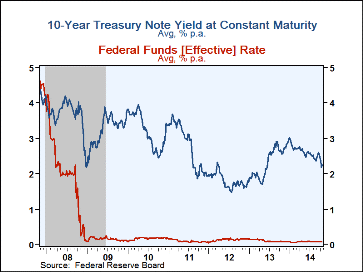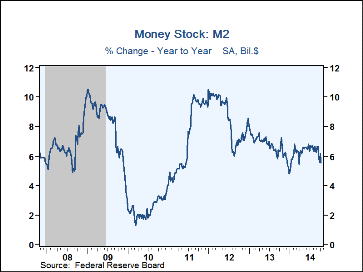 Global| Oct 29 2014
Global| Oct 29 2014FOMC Ends QE As Economy Improves & Inflation Remains Low
by:Tom Moeller
|in:Economy in Brief
Summary
At today's meeting of the Federal Open Market Committee, the Fed indicated that labor market improvement, moderate growth in household spending and positive business investment growth allowed for ending its asset purchase program, [...]
At today's meeting of the Federal Open Market Committee, the Fed indicated that labor market improvement, moderate growth in household spending and positive business investment growth allowed for ending its asset purchase program, known as Quantitative Easing (QE). That end came in the context of stability in both inflation pressures and long-term inflation expectations.
Measured inflation, however, was expected to rise. "Although inflation in the near term will likely be held down by lower energy prices and other factors, the Committee judges that the likelihood of inflation running persistently below 2 percent has diminished somewhat since early this year."
Ongoing economic improvement was to be assessed in the context of the dual objectives of maximum employment and price stability (2% inflation).
The Federal funds rate was left unchanged in a range of 0.00% - 0.25% and the discount rate remained at 0.75%. "Economic conditions may, for some time, warrant keeping the target federal funds rate below levels the Committee views as normal in the longer run."
The press release for today's FOMC meeting can be found here.
The backdrop to today's meeting was slower M2 growth of 5.5% y/y and slower growth in the monetary base of 13.6% y/y.
Haver's SURVEYS database contains the economic projections from the Federal Reserve Board.
| Current | Last | 2013 | 2012 | 2011 | 2010 | |
|---|---|---|---|---|---|---|
| Federal Funds Rate, % (Target) | 0.00-0.25 | 0.00-0.25 | 0.11 | 0.14 | 0.10 | 0.17 |
| Discount Rate, % | 0.75 | 0.75 | 0.75 | 0.75 | 0.75 | 0.72 |
Tom Moeller
AuthorMore in Author Profile »Prior to joining Haver Analytics in 2000, Mr. Moeller worked as the Economist at Chancellor Capital Management from 1985 to 1999. There, he developed comprehensive economic forecasts and interpreted economic data for equity and fixed income portfolio managers. Also at Chancellor, Mr. Moeller worked as an equity analyst and was responsible for researching and rating companies in the economically sensitive automobile and housing industries for investment in Chancellor’s equity portfolio. Prior to joining Chancellor, Mr. Moeller was an Economist at Citibank from 1979 to 1984. He also analyzed pricing behavior in the metals industry for the Council on Wage and Price Stability in Washington, D.C. In 1999, Mr. Moeller received the award for most accurate forecast from the Forecasters' Club of New York. From 1990 to 1992 he was President of the New York Association for Business Economists. Mr. Moeller earned an M.B.A. in Finance from Fordham University, where he graduated in 1987. He holds a Bachelor of Arts in Economics from George Washington University.
More Economy in Brief
 Global| Feb 05 2026
Global| Feb 05 2026Charts of the Week: Balanced Policy, Resilient Data and AI Narratives
by:Andrew Cates










